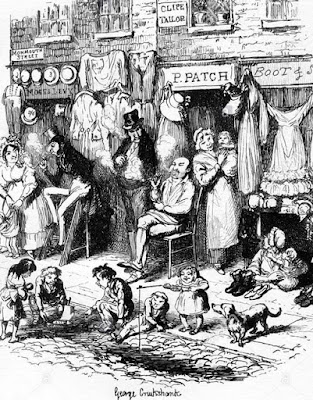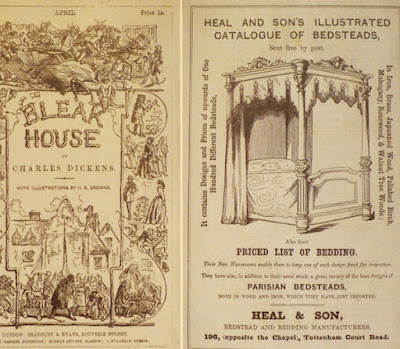Horatio Sparkins
Alias Mr. Smith
This Dickensian fabric shop in England was illustrated by George George Cruikshank (1792-1878). He drew the pictures for the 1838 edition of Charles Dickens's first bestseller Sketches by Boz.
The sketches were short humorous pieces,
quite the trend at the time.
The story, originally published in 1834: Mrs. Malden, a nouveau riche woman has her eye on Horatio Sparkins as a match for her daughter.
Mrs. Malden
A snob as only an arriviste can be, she thought Horatio the most gentleman-like man she ever saw.
Daughters Marianne & Teresa agreed; he was as noble as Prince Leopold---or perhaps Lord Byron. Pages ensue about trying to interest Mr. Sparkins, who appears to be falling for the marriage plot.
A daughter, perhaps Teresa
One day the ladies decided to go shopping at Messsrs Jones, Spruggins & Smith's of Tottenham-court-road, which was a "dirty looking ticketed linen-draper's shop," a deplorable place. "What would Mr. Sparkins say?" the girls want to know.
Marianne
(I think Cruikshank has drawn her a little young.)
They ask to see some silk. The clerk yells for Mr. Samuel Smith who "leaped over the counter with great agility, and placed himself before the newly-arrived customers," much to their horror. You can guess who it was: their hero was in reality, "the assistant at a 'cheap shop;' the junior partner in a slippery firm of some three weeks' existence." The romance was OVER.
You probably had to be there to find this really funny, but Dickens was making fun of the class of gentlemen (and women) who held themselves above people in trade, although they were only one generation or less from working themselves. It's the same plot Jane Austen mined but better---with more sympathy for Teresa and Marianne if not their parents.
Prices in the window!
Just a step up from shops like these
The story and the illustration give us some idea of the hierarchy of fabric shops (everything's a hierarchy in 1830s London). Jones, Spruggins & Smith was what we might call a pop-up-shop---a temporary retail business, of which there were many at the time. It was so tacky they had prices posted (ticketed goods.) I'd guess their modus operandi was buying auction lots of distressed or unfashionable goods cheap and opening a succession of shops.
Located on Tottenham Court Road in the heart of the retail district, the small temporary shop was near more established stores like Heal's (advertising on the back of a later Dicken's novel.)
https://books.google.com/books?id=e0JWAAAAcAAJ&pg=PA220&lpg=PA220&dq=cruikshank+horatio+sparkins&source=bl&ots=XsFxkxvikp&sig=ACfU3U0XFQnIc05LH833GlVBk6EjiC6DMQ&hl=en&sa=X&ved=2ahUKEwj6x9iW0vHkAhVE-6wKHQQTDGEQ6AEwEnoECAkQAQ#v=onepage&q=cruikshank%20horatio%20sparkins&f=false
But then I've spoiled the plot for you











A very clever man - the well to do loved him without realising that he was poking fun at the system!
ReplyDeleteOne of my ancestors was a draper! He was originally a linen salesman - taking his name into account, I'm guessing Irish linen! His father-in-law seems to have been a pinner on the records, but was a superannuation officer at the Mayor's office in Gloucester. I have no idea what they were up to! LOL! My schoolfriend's grandparents ran a little old haberdashery shop that was so dark with oak shelving. An amazing place. It had a peculiar smell too - I'm sure that it would have been similar - time stood still in that shop!
You didn't spoil a thing! I thought I had read ALL of Dickens, but somehow missed this, so I'm grateful to you, and for the link.
ReplyDelete